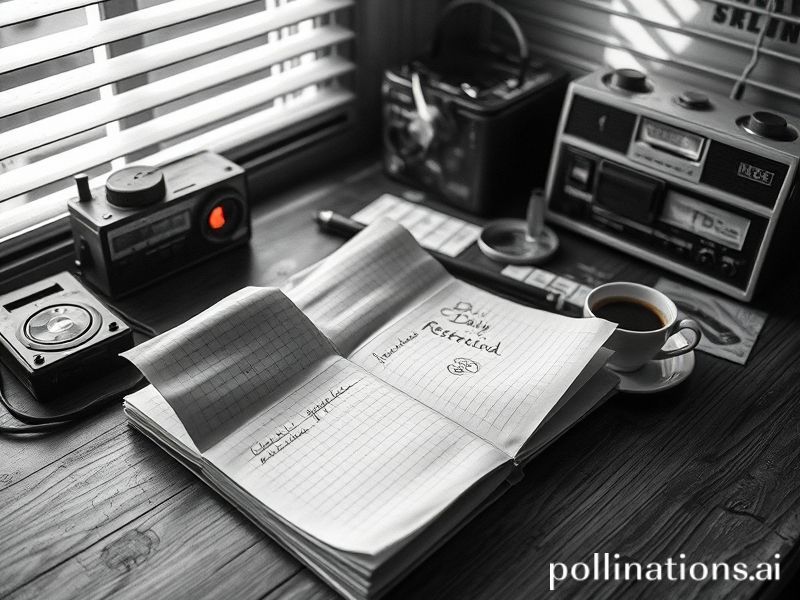The Global Daily Record: How Humanity Counts Itself Into Oblivion
The Daily Record: Humanity’s Obsessive Love Affair with Counting Itself
PARIS—In the predawn hush outside the Hôtel de Ville, a municipal clerk named Odette prints the daily record of Parisian births, deaths, marriages, parking tickets, and—since last month—TikTok views. She stamps each sheet with the same bronze seal Napoleon commissioned for his own birthday announcements, because the French believe bureaucracy, like wine and pessimism, improves with age. Across the planet, from Reykjavík’s geothermal data center to Jakarta’s traffic-control bunker, an identical ritual unfolds: someone, somewhere, is logging what happened yesterday so that tomorrow can pretend to be surprised.
The daily record has become our species’ most democratic superstition. Dictators demand it, democracies publish it, and algorithms monetize it. In Singapore, the record is a color-coded app that buzzes when the national mood drops below “buoyant.” In Caracas, where inflation makes the ledger obsolete by lunchtime, citizens keep their own parallel archive on WhatsApp voice notes—part chronicle, part lullaby against chaos. Meanwhile, Icelanders track how many tourists tried to lick the Gullfoss waterfall for Instagram. (Yesterday: four. Frostbite cases: two.)
The global implications are as absurd as they are profound. Climate scientists in Zurich now synchronize their ice-core readings with Spotify’s daily top 50, noting correlations between sea-level rise and the popularity of lo-fi remixes. The U.N. uses supermarket loyalty-card data to predict famine—because nothing says “impending humanitarian crisis” like a sudden spike in canned-bean purchases in the Sahel. And in Tokyo, an A.I. that monitors convenience-store receipts has apparently learned to forecast divorce filings three weeks in advance; the algorithm flags chilled sake and single-serving bento boxes as leading indicators.
Yet the more comprehensively we record, the less we seem to remember. Archives swell, memories shrink. In Nairobi, the National Archives occupy an entire brutalist block, but the elevator has been broken since 1997, so nobody visits. Instead, Kenyans rely on Twitter threads curated by a 19-year-old in Kibera who charges five bucks to dig up “what really happened last Tuesday.” His most requested item is not a state communiqué but the CCTV clip of a politician slipping on a mango peel—proof, his clients say, that karma keeps receipts too.
Of course, not all daily records are equal. Brussels issues a 400-page bulletin detailing European Commission biscuit preferences; meanwhile, Gaza’s daily record is a voice message from a doctor counting power cuts, because paper is scarce and electricity even scarcer. The West debates whether to call this asymmetry “data poverty”; the doctor calls it Wednesday.
The darker joke is that our records may outlast us. Silicon Valley firms now bury time-capsule servers in Arctic permafrost, storing every sneeze and swipe for future archaeologists—assuming the permafrost stays permafrost. Should the servers thaw, the data will trickle out like a dystopian glacier, informing whatever evolves next that we measured everything except why.
Still, there is perverse comfort in the ritual. Each morning, the clerk in Paris, the coder in Nairobi, the doctor in Gaza hit “save,” asserting that today mattered, even if only to the ledger. It is a collective act of defiance against entropy, like numbering grains of sand while the tide rolls in. The tide, naturally, keeps its own record—in wave height, erosion, the slow arithmetic of goodbye.
So the daily record endures: a planetary diary written by billions of unreliable narrators, edited by autocorrect, and audited—eventually—by the heat death of the universe. Until then, we keep counting, convinced that if we log the chaos precisely enough, it might start making sense. Spoiler: it won’t. But the filing deadline is midnight, and the bronze seal is warm in Odette’s hand.







